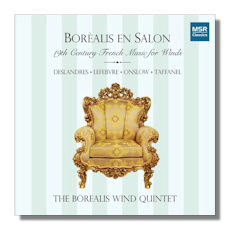
The Internet's Premier Classical Music Source
Related Links
Search Amazon
Recommended Links
Site News
 CD Review
CD Review
Boréalis en Salon

19th-Century French Music for Winds
- Claude-Paul Taffanel: Quintette pour instruments à vent
- Adolphe Édouard Marie Deslandres: 3 Pièces en quintette
- André Georges Louis Onslow: Quintette, Op. 81
- Charles Édouard Lefebvre: Suite, Op. 57
Borealis Wind Quintet
MSR Classics MS1250 TT: 69:27
Summary for the Busy Executive: Get comfortable.
It's become increasingly clear to me that MSR has built a lovely catalogue of recitals and chamber music. The label has introduced me to really good repertoire and artists off the beaten path. This disc continues that trend.
Taffanel earned his place in history as one of the all-time great flute players. You can make a strong case for 19th-Century France as a golden age and Eden of wind music from the Napoleonic era on, and Taffanel contributed, not only as a renowned performer and pedagogue, but as an influential conductor and the founder of a chamber music society for winds, the organization for which Gounod wrote his Petite Symphonie. It interests me that all the composers here, except Onslow, were born in the 1840s. It almost makes me believe in the alignment of the stars. At any rate, Taffanel reveals himself as a composer of the utmost sophistication and refinement. His Quintette should become a major stop for wind ensembles. It has all the qualities I associate with French music: wit, sophistication, a sense of proportion, and an intellectual modesty. Wagner may give you grand visions and great passions and lift you into the empyrean on his mighty wings. Taffanel offers wonderful conversation across the dinner table, and, believe me, that's not nothing.
Deslandre's 3 Pièces en quintette appear late in his output, which concentrates mostly on sacred choral music. He wrote it for the Societé Moderne d' Instruments à Vent, which succeeded Taffanel's organization, where it premiered with Georges Barrére, the society's founder and later first flute of the New York Symphony Orchestra, in the ensemble. It's less complex than the Taffanel, and the movements are short. Nevertheless, it remains a marvelous example of French Romantic lyricism, pre-Debussy and -Fauré.
George Onslow is two generations older than everybody else. He was born to an English father who had to flee to France, one step ahead of a homosexual scandal. Dad married a Frenchwoman, and George was the result. Then came the French Revolution and the Onslows fled France for Germany, returning after the Terror. George revealed himself as a composing prodigy. He wrote operas before he actually studied, although he eventually received instruction from Reicha. The Onslow family was well-to-do and George could afford to follow his compositional interests. His music found less popularity in France than in Germany. During his lifetime, many considered him the equal of Mendelssohn (the fools!), but after his death, his reputation plummeted into oblivion. Recently, his chamber music has undergone a revival on disc. A late work, the Quintette strikes me as the weakest work here – stodgy, clunky, and just not very interesting. I prefer Onslow's early work.
Charles Lefebvre, son of the painter Jules, studied with Thomas and Gounod and became a professor at the Paris Conservatoire. As a student, he won the Prix de Rome, and in general he concentrated on oratorios and on works for the stage. He had the regard of his contemporaries but stood in the shadow of people like Saint-Saëns and Gounod. His Suite, written for Taffanel's Societé, puts on no airs at all, except in witty irony. He sends up "learned" counterpoint with an opening canon – not so much a canon as a call-and-response, like the finale to the Franck Violin Sonata – a loose tissue of counterpoint. The finale, however, is tighter, a delightful composer's holiday, where we get an assortment of composer's tricks and jeux d' esprit. The ensemble writing is superb.
New to me, the Borealis players deliver impressive performances. They not only have elegance and style, but they seem to have absorbed the notes into their bones, returning free and "natural" accounts. If they can't resuscitate the Onslow, nobody can. A disc to savor.
Copyright © 2012, Steve Schwartz.




















